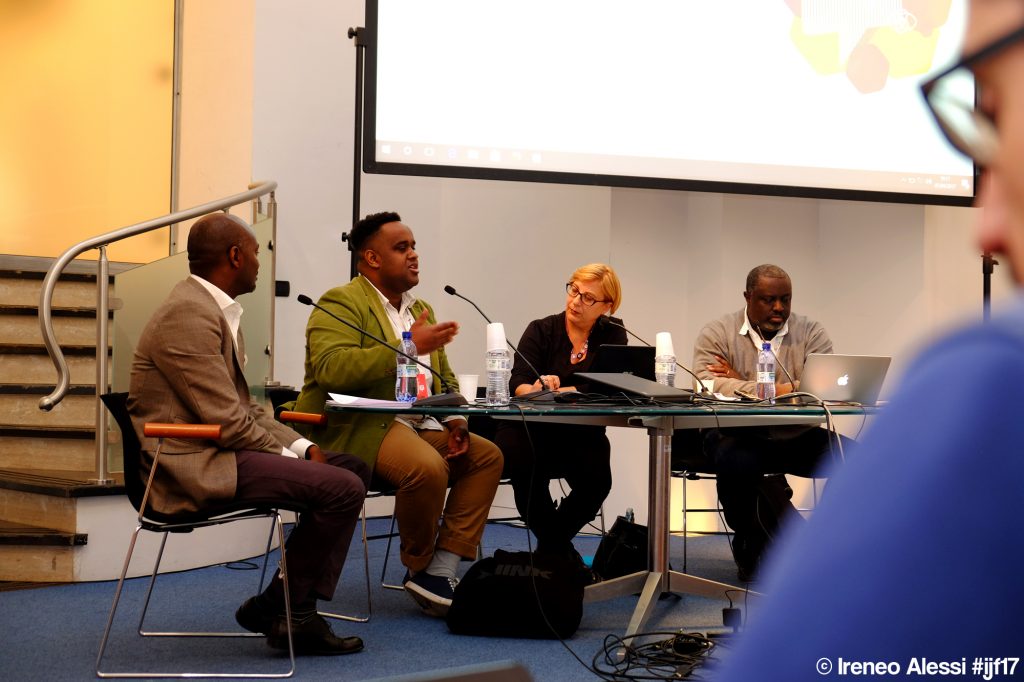
The situation of extreme crisis in the African continent has pushed journalists, who traditionally are the watchdogs, storytellers and informers, to take on a new role of activism. While journalists were already acting as the voice of the voiceless, that very same voice can be heard much louder when they take on the role of activists. A panel consisting of Antoine Kaburahe , the founder and editor of Iwacu, Andrew Mwenda, the managing director at Independent Publications, Ismael Einashe, freelance journalist from the global quarterly Index on Censorship magazine, and the moderator Antonella Sinopoli, co-founder and editor-in-chief of Voci Globali, unpacked what it means for journalists to serve as activists, with case studies from Africa.
Kaburahe is now based in Europe after fleeing from his country, Burundi. “I have been forced to leave Burundi because it was not possible to work there, it was very dangerous”, he says. To date, there are over 100 journalists from Burundi that have gone into exile. Kaburahe says that two years ago a failed coup took place, and the media was accused of being against the president making it difficult for journalists to work there.
Although he no longer lives in Burundi, Kaburahe still manages to publish using various social media platforms such as Whatsapp, Twitter and Facebook “because social media can’t be stopped”. He says that the government does cut off the internet but social media continues to be the driving source of publishing news and information although they have to do that in difficult conditions. Several months ago, one of the journalists working for Kaburahe was arrested: since then, no one has had any news about his whereabouts, whether he is dead or alive. This case shows the extreme dangers that journalists in Burundi face.
Einashe, who is originally from Somalia, is currently based in London. He mentions that journalists in Africa who are covering very sensitive issues have no other choice than becoming activists. He told the audience about the challenges when reporting in Africa, sometimes due to the fact that people who want their stories to be told may prefer speaking to Western journalists, as they are perceived as potentially more helpful and credible. Although slightly different, Einashe says that he has experienced a similar situation in Sicily when he was reporting on migration issue: police tried to stop him from reporting, as they were not believing he was a journalist.
Mwenda, speaking against Western-aid, says that Africa “is controlled and dominated largely by the West on every arm and leg of its existence”. He says that stories about Africa are being told by the BBC, CNN, Washington Post, the New York Times, which put forward the narrative that African countries are poverty-stricken, sick people are helped by western organisations, and wars are ended by UN peace-keepers. Mwenda says there are Africans travelling to Western universities to learn who they are and what they are, portraying an Africa dominated by the West. In this context, he says his journalism represents Africans who take responsibility for their actions and define who they are. “The future of Africans will only be done by Africans…..Please! Let us make our own destiny, this is the greatest gift you can give to us”, says Mwenda.
Kaburahe says he does not like the term ‘activist’ and that “a journalist is a journalist, but in some conditions a journalist is an eye-witness”. He says that news organisations such as the BBC used to be present, on the ground, reporting on what was happening in Burundi, but that, due to the dangerous situation and the escalation of violence in the country over the past two years, there aren’t as many western journalists covering the situation any more. Antoine says it is a big honour for his colleagues who are still in Burundi to cover the story despite the dangers.
Although the means of publishing stories in Burundi is not through traditional journalism (as stories are rather being published on social media platforms), it really paints a picture that journalists are willing to serve not only as watchdogs but also as activists. They are fighting for the voiceless and for the stories that must be told. This is a reminder that journalists, not only in Africa but everywhere, have a huge responsibility that entails standing up against dictators and regimes that are placed for the sole purpose of oppression. The true essence of journalism is the will to oppose governments that violate the human rights of individuals and such governments must be held accountable.